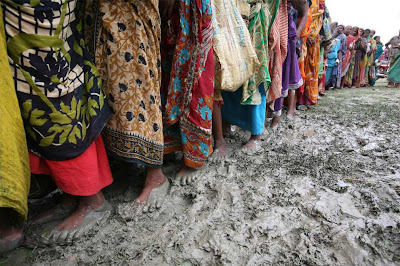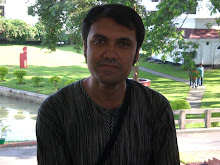
India, Bangladesh to help people stuck in enclaves
Posted: Sep 05, 2011 1:05 PM Updated: Sep 05, 2011 5:35 PM
By JULHAS ALAM and RAVI NESSMAN
Associated Press
DHAKA, Bangladesh (AP) - The village of Votbari is a tiny island of India surrounded by a sea of Bangladesh.
A victim of absurd map drawing during the 1947 partition of the Indian subcontinent, the enclave has been all but abandoned by both nations. It has no paved roads, electricity, hospital or schools. Its destitute residents get no aid from either side. Years of regional tensions have kept it in limbo.
"There is nobody to look after us," resident Jober Ali said. "We have no country ... I do not have any identity. I am nowhere."
Indian Prime Minister Manmohan's Singh's visit to Dhaka starting Tuesday could end the suffering for tens of thousands of people trapped in dozens of such enclaves on both sides of the border.
With India's ties with rival Pakistan to the northwest frozen in enmity, it has turned its attention toward smoothing out its bumpy relationship with its northeastern neighbor.
The two nations are expected to tackle tensions over water resources, trade barriers and transit links. They also plan to resolve disputes over their 4,096-kilometer (2,545-mile) border - and with it, the enclave conundrum.
There are 111 Indian enclaves inside Bangladesh and 51 Bangladeshi ones inside India, with a combined population of 51,000, according to a recent survey jointly conducted by the two governments.
The residents of the enclaves have been compared to stateless people, without any of the services offered in either country and no one to take responsibility for them.
"We've lived here for decades. But nobody bothered about us. We are human beings, they do not keep that in mind," Ali said in an interview conducted over a borrowed cell phone from Votbari.
Bangladeshis living in enclaves surrounded by India suffer a similar fate.
Ali, 58, has no land for farming, no education and no hopes of a permanent job. His family of 13 squeezes into a single straw hut because they have no extra land to build another home. He supports them with irregular work as a day laborer.
The village of 3,000 has almost no infrastructure save for a few narrow, muddy roads - plied by bicycle rickshaws - that Bangladeshi authorities built for them as a humanitarian gesture.
Officially, Votbari residents are not allowed to leave their village and enter Bangladesh without a visa. But there is no fence and since they have never even been given Indian passports, Bangladeshi authorities look the other way and let them pass.
They do their shopping in Bangladesh, use Bangladeshi currency and rely on Bangladeshi hospitals in case of emergencies.
Asir Uddin, 60, said he often sneaks out of the village to find work as a day laborer.
"We cannot give our identity. We lie to people when someone asks where we're from," he said.
The situation is worse at the border of their own country, India, three-quarters of a mile (1.2 kilometers) away.
There, Ali said, Indian guards open fire at them if they try to cross. Human rights groups have accused Indian forces of routinely shooting those trying to enter illegally from Bangladesh.
While there are a smattering of similar enclaves scattered about Europe, central Asia and the Middle East, the Indo-Bangladesh ones are by far the most extensive, and the most convoluted, according to a 2002 paper by Brendan R. Whyte, of the University of Melbourne.
Some have small counter enclaves inside them, Whyte wrote. There is even one tiny Indian enclave inside a Bangladeshi enclave inside an Indian enclave inside Bangladesh.
According to popular legend, the enclaves were created when two chess-playing royals gambled away villages from their kingdoms. But Whyte and other historians say their creation is rooted in 18th Century fighting between the kingdom of Cooch Behar and the Mughal Empire. A treaty set boundaries, but some feudal lords in Mughal territory remained loyal to Cooch Behar and vice versa, leading to the enclaves.
When the subcontinent fell under British rule, this quirk didn't matter much. But when the region was partitioned between India and Pakistan at independence in 1947, the border kingdom of Cooch Behar joined India, leaving thousands of its now-Indian subjects trapped in East Pakistan and thousands of Pakistanis trapped in India.
After India helped Bangladesh secede from Pakistan in the 1971 war, the two nations developed close ties and signed a 1974 treaty that would have resolved the problem. But India never ratified the treaty and independence leader Sheikh Mujibur Rahman was assassinated in a 1975 military coup, torpedoing the plan and ushering in an era of icy relations.
New Delhi complained of millions of illegal Bangladeshi immigrants and accused Dhaka of giving sanctuary to myriad insurgent groups leading violent rebellions against Indian rule in its northeastern states. Dhaka complained of its massive trade deficit with India and accused New Delhi of stealing its water.
Singh and Bangladesh Prime Minister Sheikh Hasina, Rahman's daughter, have been working to fix this over the past two years.
Bangladesh cracked down on the Indian insurgents, a move that forced many of the groups to the negotiating table with India.
India offered Bangladesh a $1 billion loan, raised quotas on textile imports and appears ready to resolve the water dispute.
"There is a major shift in our relationship," Indian Foreign Secretary Ranjan Mathai said Monday.
While India still has major border disagreements with Pakistan and China, it is hoping to resolve nearly all its issues with Bangladesh in time for Singh's two-day visit.
The plan entails each country absorbing the enclaves inside its territory and giving citizenship to the residents or allowing them to move to their home country, where they would be provided new homes, Indian Home Minister Palaniappan Chidambaram told Parliament last month.
As Muslims, the villagers in Votbari feel closer to Bangladesh than Hindu-majority India, and many say they will stay right where they are.
"We are all united in wanting to be part of Bangladesh," Ali said. "We are Muslims. They are also Muslims. So they have feelings for us. They are like our brothers."
Nurul Amin, 26, who was forced to start driving a bicycle rickshaw at the age of 12 to support his family, hopes the deal will bring a brighter future for his two daughters, aged 5 and 3.
"I want to educate my two children. I don't want them to live a life like me," he said.
___
Nessman reported from New Delhi.
___
Follow Ravi Nessman on Twitter at http://twitter.com/ravinessman
Copyright 2011 The Associated Press. All rights reserved. This material may not be published, broadcast, rewritten or redistributed.



